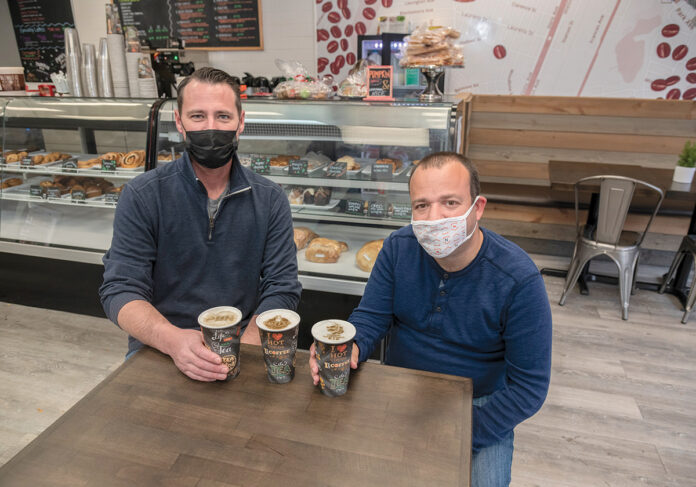The changing restrictions for restaurants in recent months have been severe. Curbside pick-up only. Outdoor dining only. Capacity limits.
And now the latest: curfews that set closing times for bars and restaurants four hours earlier than usual.
The COVID-19 outbreak has put a bind on those in the hospitality sector across the country. But despite the countless restrictions eating into already slim profit margins, that hasn’t stopped aspiring restaurateurs from braving the pandemic and opening eateries in Rhode Island.
In Newport and Bristol County, 21 new restaurants have opened since March, according to Kathryn Farrington, the vice president of marketing for Discover Newport. Another 13 opened in Providence and Warwick, according to Greg Desrosiers, communications manager for Providence Warwick Convention & Visitors Bureau.
The new spots range from Drift Café, a bright specialty coffee and blended smoothie bowl bar on Thames Street in Newport to the piano and cocktail bar The George on Washington in Providence.
Some opened just weeks before the pandemic turned the restaurant industry upside down in mid-March, while others have only existed in pandemic mode.
‘We broke ground probably at the worst time.’
KEVIN O’DONNELL, Giusto owner
Some restaurateurs had begun planning their new ventures before the crisis and had no choice but to plow ahead. Others have launched with the thought that the tough times won’t last. But all have had to cope with the changes the pandemic has brought onto the industry by government-mandated restrictions.
In Rhode Island, capacity continues to be capped at 50% indoors, and dining outside has been encouraged, even as New England heads into the chilly winter months. R.I. Commerce Corp. allocated $5 million in grants for restaurants to purchase items such as outdoor heaters, and the Rhode Island Hospitality Association has campaigned for customers to “bring your own blanket.”
Chef and restaurateur Kevin O’Donnell, a Rhode Island native who moved back to the Ocean State in April after making a name for himself at the popular SRV, an Italian wine bar in Boston, leased space at Hammetts Hotel in Newport to open Giusto.
“We broke ground probably at the worst time,” said O’Donnell, who took out loans and used his share of the business from SRV to hire local construction and design businesses to create an ambiance that paired with the wharf views.
“I maxed myself out,” he said.
The restaurant debuted in September, but COVID-19 added to the initial cost of opening. To avoid distorting the water views, he purchased ultra-clear polycarbonate glass for dividers to place in between groups of indoor diners. He also bought outdoor heaters and additional personal protective gear and cleaning essentials.
All told, the pandemic forced O’Donnell to tack on an additional 5% to his construction budget.
Down the road, at America’s Cup Avenue and Thames Street, sits Stoneacre Garden, a unique sister restaurant of Stoneacre Brassiere. It opened in July and boasts ample indoor seating, as well as rooftop space and a greenhouse for an al fresco experience. It serves Asian flare with menu items that range from ahi tuna tacos with wonton crisp to udon noodles with Maine lobster and farm stand vegetables.
Playing off the Stoneacre brand has given the new restaurants a leg up, said event manager Christine Bevilacqua, who has recently hosted intimate weddings, rehearsal dinners and bridal showers.
In Cranston, after a bakery closed next door to Brian Buonaiuto’s real estate company in Rofle Square, he said the neighborhood needed to fill the void.
“We didn’t like an empty door,” said Buonaiuto, who opened Coffee & Crumbs with his associate Terry Coburn. “And the neighborhood needed a coffee shop.”
Both had worked in the restaurant industry for years, but they opened just weeks before the pandemic shutdown in March. Of course, they’ve found that attracting customers has been much more difficult in the coronavirus crisis.
“In the beginning, we opened and stared at each other when four people walked in during an eight-hour shift,” said Buonaiuto.
Buonaiuto signed the café up for delivery services such as Grubhub Inc. While they were able to expand their customer base, third-party services take nearly 30% of the ticket price.
“The fees are brutal,” said Buonaiuto. “We’re not profitable at this point.”
The customers will return, said James Griffin, a hospitality professor at Johnson & Wales University. Being ahead of the market might serve these new restaurateurs well in 2021, he said.
“We have a desire to go out and socialize and eat and drink wine,” said Griffin. “That hasn’t gone away. It’s now just concentrated demand with a barrier of safety.”
It’s also a matter of adapting. Griffin said he has seen restaurants with menus that had 20 items on them shrink down to the six profitable items that have become specialties.
“There’s tremendous opportunity. But you better be a ninja,” he said. “Restaurants are focusing, not expanding.”
Alexa Gagosz is a PBN staff writer. Contact her at Gagosz@PBN.com.










